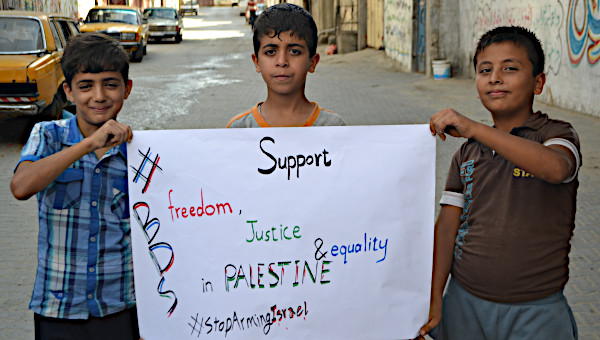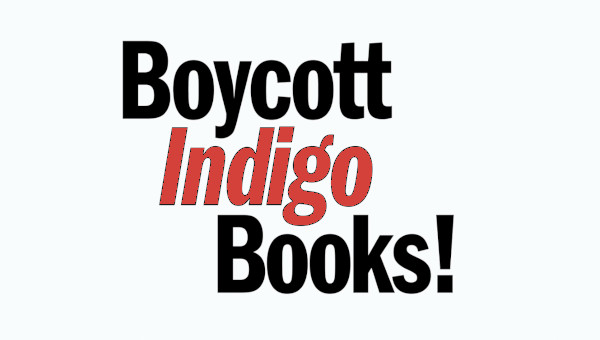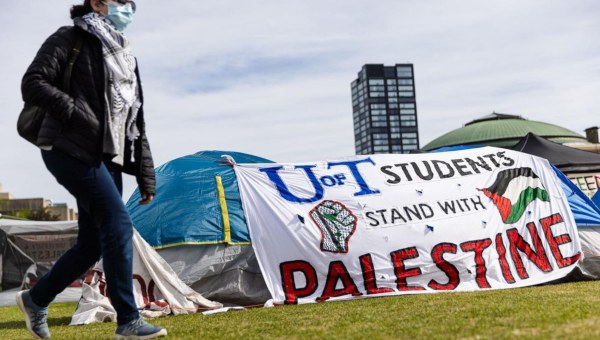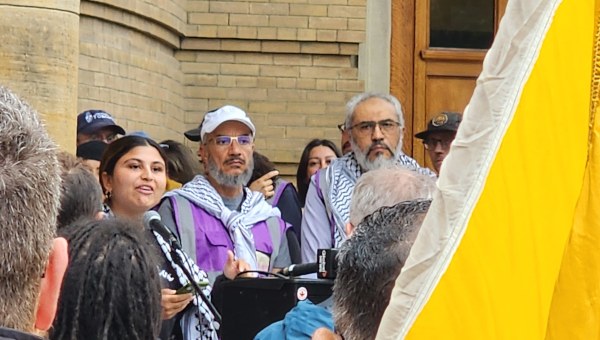For Free Expression on Palestine
On April 15, 2009, a number of organizations launched a campaign in Toronto to demand the right to free expression on the Israel/Palestine conflict with an event on the University of Toronto (U of T) campus. Some 100-150 people attended. Speakers addressed several recent cases of suppression of free expression on the issue of Israel/Palestine. They argued that there is a concerted attack on free expression on this question underway, and that to protect this right requires all individuals and organizations with an interest in free expression, regardless of their stance on the Israel/Palestine conflict, to speak out now. This article is a report on the April 15 event and a dossier of key incidents and articles on the issue.
A 2002 precedent: Sherene Razack’s case
The moderator of the evening was Sherene Razack, a professor at the Ontario Institute for Studies in Education (OISE) and author of several books, including Dark Threats and White Knights: The Somalia Affair, Peacekeeping and the New Imperialism and Casting Out: The Eviction of Muslims from Western Law and Politics. She presented the story of her own experience with free expression on Israel/Palestine. In May 2002, Razack helped launch the Canadian Critical Race Studies Conference as part of the group Canadian Academics of Colour. The conference took place just after Israel’s invasion of Jenin. (Then as now, people speaking out were scrutinized for their choice of words. Just as today referring to Israeli policy as ‘apartheid’ is viewed as outside the bounds of acceptable criticism, in 2002 referring to Israel’s invasion of Jenin as a ‘massacre’ provoked similar reactions. (See my “What Happened in Jenin?” for a review of some of this now largely forgotten debate.)
Given the importance of Israel’s re-invasion of the West Bank in 2002 and the particular importance of the invasion of Jenin, conference organizers were criticized for not scheduling any event on the issue at the Critical Race Studies conference. In response organizers, including Razack, organized a meeting at the conference, where a resolution was drafted condemning Israel’s actions in Jenin. Razack distributed the resolution over email (to do so on this issue continues to be risky business for academics, as the recent case of William Robinson at the University of California Santa Barbara shows).
The reaction to Razack’s email distribution of the resolution was not immediate. Four months later, in August 2002, the campaign began, and Razack started to receive the hate emails. Razack was not the only one targeted. Several others, including a staff member at the Toronto Women’s Bookstore (TWB), received emails. The TWB staffer’s crime was allowing the store to sell pro-Palestine buttons. The CanWest-owned National Post published a series of articles about Razack, always claiming that she “refused to respond,” when in fact they refused to acknowledge or publish her letters of reply. Razack and her Dean received obscene phone messages and threats, with emails from all over containing similar formulations and lines of text, suggesting an organized campaign. The emails were consistent in their sexist and racist tone. A frequent message was “go back where you came from.” Assuming she was an Arab or Muslim, hate-mailers would remind her that she was from a barbaric and patriarchal culture and had no right to criticize a democratic state: to criticize Israel, they said, was to abandon feminism.
Razack noted two points of interest. First, that the press, rather than reporting the events from a stance of neutrality, was a part of the campaign against her. The National Post, along with B’nai Brith, sought to get her fired. Second, the attacks against her, like the current attacks, sought a legal mechanism to use against those who speak on Palestine. In Razack’s case, the question was whether she had the right to use her University account to distribute the declaration from the Critical Race Studies Conference. In the event, the attempt to get her fired failed. The Vice President, who agreed to meet B’nai Brith and the National Post, ended up annoyed when the Post and B’nai Brith brought six people, including 2 lawyers and the press. The National Post published an article immediately saying that the University “refused to act” against Razack. The University Vice President sent a letter back saying this was unproductive, harassment of University personnel that would not be tolerated and that Razack had not violated the University’s policy on the use of information technology. The VP added that the declaration was from the Critical Race Studies Conference, not the University of Toronto, and that U of T’s interest was in defending academic freedom and free speech. Razack was provided security for her classes after disruptions were threatened. She wasn’t disciplined, and she was not fired. She wondered, however, whether her story would have played out the same way today. While informal “sanctions” against her continue to this day (with speaking invitations and grants disappearing without explanation), formal sanctions were not imposed. She was protected by U of T’s policy. For a policy to provide protection, however, two elements are required, Razack reminded the audience. First, the rule has to actually provide protection. Second, political will has to be behind the defence of the rule. Since 2002, laws and policies have changed in various ways, and the political will to defend free expression seems weaker. “There is a lot to be lost here,” Razack concluded, and while there is perhaps more organized public response to suppression of free speech, the institutional response is weaker.
Legal cases move forward
The next speaker was Hadayt Nazami of Jackman & Associates, the law firm representing both George Galloway and the Canadian Arab Federation in their legal challenges to the Immigration Minister’s recent rulings against them. Nazami began by assuring the audience that, despite news of recent setbacks in these cases, they are proceeding and they have a strong legal basis.
He began by describing the case of George Galloway, a British MP who was banned by the Canadian government from a speaking tour in March (see Galloway’s reply, and see him facing the Jewish Defence League, who seem to have played a role in his banning). Galloway (who was allowed into the U.S., a country generally thought of as being more paranoid about terrorism than Canada) ended up speaking to Canadian audiences via satellite, but sought an injunction to stop the government from banning him so that he could enter Canada.
In barring him, Nazami reported, the government used the Immigration and Refugee Protection Act, meant to catch those who pose a credible threat to “national security” or those with “real ties” to terrorism. This law was not drafted for such situations. However, because of the overbroad nature of this provision on terrorism in the Immigration and Refugee Protection Act, it is open to abuse.
The purpose of the Court proceeding was to have a judge order the government to allow Galloway into Canada for the duration of his speech tour only, while a final decision on the actual challenge of barring Galloway goes through the normal Court process which would take many months. In Court, the government took the position that the decision to ban Galloway was not in fact a final decision but a courtesy informational letter informing him that he might be barred. According to this position therefore the Court would not have jurisdiction over the matter and the government did not have to present evidence against Galloway. So, while Galloway’s lawyers sought that the court grant an emergency order so that Galloway can enter Canada for his speeches before the actual case is heard by the Court, the court decided not to do that. An interim order in this context is an extraordinary measure which does not have precedence in Canada. Instead of ordering the government to let George Galloway enter Canada now, the Court decided to wait until the case is fully assessed by a judge at a later stage in a normal setting. The ruling was so because irreparable harm to Galloway and Canadian supporters could not be demonstrated (especially since the speech was going to proceed anyway via satellite). The judge did state that evidence presented to Galloway by the government as basis for barring him did not amount to real evidence but hearsay. This was acknowledged by the government lawyer. The main legal challenge will proceed in the Court. For his part, when Galloway spoke by satellite, he promised to be available on short notice the minute the ban was lifted to come to Canada to do the speech properly (here is one of the talks he gave by satellite).
Nazami then turned to the Canadian Arab Federation (CAF), whose funding for English as a Second Language (ESL) programs was cut when its president, Khaled Mouammar, criticized Immigration Minister Jason Kenney and others for their support of Israel (referring to them as “professional whores”). Kenney replied insinuating that CAF supported anti-Semitism and terrorism, accusing it of “nonviolent extremism” and saying that such organizations should not receive support from the government (useful overviews of the events are provided by Khaled Mouammar’s daughter Randa, and by student journalist Asam Ahmad, with Mouammar’s own reply published online in the National Post’s Comments section). There too, lawyers sought an interim injunction to stop the harm that would ensue from defunding CAF until the case was argued in court. The judge argued that there would be no irreparable harm from the defunding, so the case would have to go to court. The judge commented, however, that it was very disturbing that a speech could be used to cut funding to a language program. Further, the Judge noted that there was evidence of political interference in the decision making by the Minister. The judge noted that the decision to defund CAF was in breach of basic legal rules of fairness. So, while the Court did not block the defunding, the court found serious problems with the government’s approach, and this case too will go forward.
Nazami pointed out that these are political cases, not solely legal ones, and such cases are not decided solely in the courts. Judges were interested in all the statements and affidavits that went forward on the Galloway and CAF cases. For free expression, the political issue is at the core and the public must push to defend its free expression. Nazami concluded by saying that public support and mobilization would be necessary to defend free expression and that these two free expression cases, which are far from over, will not be won without such mobilization.
A short history of “nonviolent extremism”
The third speaker was Ali Mallah, Vice President of the Canadian Arab Federation, who presented a short history of the organization. CAF was founded in 1967, Mallah said, “before the Minister for Censorship and Deportation was born, and it will go on after he’s gone.” (Worth noting here that Kenney is also active in ordering deportations: see Hussan and Scott’s April 22/09 article on recent immigration raids.)
CAF sought to address Arabs in Canada and outside, and it sought from its inception to include the question of Palestine. Mallah argued that perhaps Kenney’s cutting of funds was an opportunity for renewal, since CAF had only started taking government funding in the 1990s. “Were we tricked into it by Bob Rae?” Mallah wondered about CAF’s decision to undertake settlement and social service programs funded by JobsOntario in the 1990s. The funding made CAF more vulnerable, he argued. The funding created a constituency in the community that argued against taking principled positions, and in favour of “diplomacy,” of “working within the system,” so as not to “bite the hand that feeds you.”
Attacks on CAF did not begin in 2009 with Harper and Kenney, but at the end of the Chretien era with the Liberal Paul Martin government, when Arabs who had been activists in the Liberal party for years were suddenly shut out of candidacy for their views on Palestine and Iraq. It was the Martin government, Mallah reminded the audience, that instituted “security certificates” (for a recent case of security certificates and its relevance to civil liberties see my “Canada’s War on Terror Hangover” and this 2003 interview with Toronto immigration lawyer Amina Sherazee). Mallah said that Kenney had falsely accused CAF of “hate” and “anti-Semitism” long before he became Immigration Minister, that CAF had invited him to defend his allegations in open debate, and Kenney had refused (just as he refused to debate Galloway).
Attacks on CAF intensified in 2006, with Israel’s war against Gaza and Lebanon. In those days CAF and others were involved in organizing huge mobilizations in every Canadian city against Israel’s wars. These were not solely Arab or Muslim community mobilizations: Mallah estimated that 60-70% of those demonstrating were not Arab or Muslim. At the time, both Mallah and CAF’s president Khaled Mouammar made statements condemning the wars. B’nai Brith wrote to the Attorney General on August 2006 asking that they investigate CAF. CAF met with police Chief Blair, but with no evidence the investigation did not proceed, “because we still live in a liberal society with human rights, Minister of Censorship or not.” Throughout 2006-7, attacks spread from CAF to other targets, such as the Canadian Peace Alliance and the Toronto Coalition to Stop the War. The CanWest-owned Ottawa Citizen wrote that the “Canadian Left” was “conspiring with Islamists in Cairo and Beirut” because many attended a conference there. Mallah suggested that as an Arab and a Leftist, he was amused to hear about a “conspiracy between me and me.”
“While it is true that Khaled said what he said,” Mallah argued, “it is so much less than what Harper said in 2006 when he defended the bombing of Lebanon as a ‘measured response.’ It is so much less than Harper and Kenney supporting the massacre of 1400 people, 473 children, 300 women, most of the rest old people. It is so much less than the Israeli Army T-shirts that mock the deaths of Palestinians.” (See this article in Haaretz on the T-shirts)
Mallah concluded by saying that all these groups being targeted – CAF, unions like CUPE and CUPW, the CPA, the academics and students – would all have to stand together for human rights, justice, civil liberties and free expression.
Dangerous lectures
The last speaker was Rafeef Ziadah of the Coalition Against Israeli Apartheid (CAIA), who spoke principally about attacks against student organizations on campuses and attacks against unionists, particularly the Canadian Union of Public Employees (CUPE), which passed a resolution to study and conduct education on Boycotts, Divestment, and Sanctions (BDS) against Israel and has faced attacks since (Naomi Klein’s January 2009 article in the Nation is a succinct summary of the idea behind the campaign. Ziadah’s own article discusses the cultural aspects, and I wrote a report on a debate held at Ryerson University on the academic boycott in 2007, and an ensuing exchange of views between myself and one of the debaters.) Rejecting attempts to define activists from the outside, Ziadah asked: “So, who are we? We are labeled in many different ways, but let us define ourselves by our values. We value social justice, equality, and dignity, regardless of race or religion. We call Israel an apartheid state because it refuses to allow the refugees to return, because it treats Palestinian citizens as second-class, and because it occupies the West Bank and Gaza, and maintains the Apartheid Wall. You can disagree, with this, but you have to respect my right to say it.” Israel’s wars and sieges have gone to great lengths to silence Palestinians, and the right of Palestinians to tell their stories is something they will not give up, she said.
She then described the range of methods used to silence free expression. Threats from donors, smears in the media, funding cuts, physical harassment and threats against student activists by organized pro-Israel student groups. These methods have become more intense in recent months because Israel’s crimes have become so much more brazen. The attack on Gaza in early 2009, bombing imprisoned people, was so obviously a crime that there is no defending it or hiding it, so instead, the people who call attention to it must be attacked.
On campuses, other mechanisms are also used. For example, university administrations have different sets of rules for booking space depending on the issue discussed. Excessive security fees are charged, with no criteria explaining how the fee amounts are arrived at.
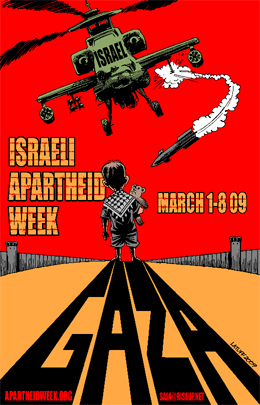
All of these mechanisms coalesced in the attack on Israeli Apartheid Week (IAW-apartheidweek.org), a week of lectures that began at the University of Toronto in 2005 and in 2009 was held at 40 campuses around the world. Lectures in the series argue that Israel is an apartheid state and in support of the BDS campaign. IAW’s poster was banned on several campuses (Ottawa, Carleton, Laurier). Liberal leader Michael Ignatieff and Conservative Immigration Minister Jason Kenney both published statements condemning IAW (see my annotated version of Ignatieff’s memo). The Jewish Defence League and others attempted to physically disrupt events and harassed and threatened organizers.
The core argument against IAW was that it was a ‘hate-fest’ and that it constituted ‘hate speech,’ and was therefore outside of legitimate debate and not protected on free speech grounds. But the Israeli state is a state like any other, Ziadah said, and so should be no more immune from criticism than Iran or China. If University Administrations and other institutions cannot recognize that these are not hate speech, nor anti-Semitic, they are de facto endorsing the suppression of free speech (CAIA made this point in a statement after IAW. Ryerson professors Judy Rebick and Alan Sears also made the argument in a memo to Kenney).
The secondary argument against IAW was that it was ‘unbalanced.’ But the demand for ‘balance’ at IAW was itself unbalanced, since no one demands that Israel advocacy events be ‘balanced’ with the presence of Palestinians and the Palestinian view. No event organized by the CJC or B’nai Brith, at which Canadian politicians frequently speak, has ever been stopped from proceeding or denied a room booking for failing to present the Palestinian point of view. The IAW poster was banned at the University of Ottawa because it apparently made some students feel uncomfortable. But no Israel advocacy event, poster, billboard, or media story has ever been banned because of Palestinian discomfort.
Ziadah concluded by outlining the free expression campaign. A basic statement on the right to discuss and debate the issues would be circulated, and all organizations interested in free expression invited to sign on. Signing on to this need not mean you endorse IAW, BDS, or any particular political position. It does mean that you agree that calling Israeli policies ‘apartheid’ and advocating for boycotts, divestment and sanctions do not constitute ‘hate speech,’ however, and that the debate needs to be protected on free speech grounds. Palestine and Palestine solidarity is today’s target, but when governments start on this road they don’t usually stop, she said, so protecting free speech on this issue would be key to protecting free speech in general. •
Below is the statement for free expression organizations and individuals to sign on to.
Free Expression Statement:
For Free Expression on Palestine
We believe that discussion and debate on the Israel/Palestine conflict falls within the realm of free expression and should not be suppressed. We believe that political criticism is among the classes of speech we should be most interested in promoting and protecting.
We demand that the full range of views on the conflict, from Israel advocacy to Palestine advocacy, be protected and not be subject to bans, penalties, or sanctions.
We reject hate speech, anti-Semitism, incitement to violence, racism and discrimination. We believe that discussion, debate, and advocacy around Palestine and Israel should be conducted in opposition to all forms of racism, discrimination, Islamophobia, and anti-Semitism.
We do not believe that characterizing Israel as an ‘apartheid state’ or campaigning for ‘boycotts, divestment, and sanctions’ against Israel constitutes hate speech, anti-Semitism, incitement to violence, racism, or discrimination. We need not agree with these characterizations or campaigns to agree that these are legitimate positions that should be protected on free speech grounds.
We believe that speech that is critical of a government and its policies, which does not target an ethnicity, nationality, or religion, must not be suppressed by a democratic society. Criticizing Israeli policies toward the Palestinians does not target Jewish people just as criticizing Sudan’s policies in Darfur does not target Sudanese people, criticizing Saddam Hussein’s past treatment of the Kurds did not target Iraqi or Arab people, criticizing China’s policies in Tibet does not target Chinese people, and criticizing the U.S. occupation of Iraq does not target American people.
Further Reading
Below are some key articles and documents of cases mentioned in the article and other related cases,
including numerous cases from the United States.
Campuses:
- Dan Freeman-Maloy, “The Israel Advocacy Push to Reclaim York U” Znet March 2/09
- Liisa Schofield, “U of T Suppresses pro-Palestinian Activism” Rabble February 18/09
- Margaret Aziza Pappano, “Academic Freedom Threatened in Ontario Universities” The Bullet February 20/09
- Justin Podur, “Annotated version of Ignatieff’s Memo”
- Denis Rancourt fired from University of Ottawa
George Galloway’s Banning:
On the Canadian Arab Federation
On anti-Semitism and hate speech:
- CAIA demands that University’s distance themselves from ‘hate speech’ claim
- Rebick and Sears to Kenney
- Jewish activists defend Hernann Dierkes
On apartheid and BDS:
- PACBI
- Naomi Klein on BDS.
- Klein-Waskow debate on BDS
- Rafeef Ziadah on cultural boycotts
- Justin Podur’s report and exchange with Stuart Murray on the Academic Boycott
- Jason Kunin on Academic Boycott
- Jason Kunin on Supporting CUPE’s boycott
U.S. Cases
- William Robinson’s case at UCSB
- Joel Kovel’s case at Bard College
- Normal Finkelstein gets cancelled
- Joseph Massad, intimidated at Columbia University: Joseph Massad’s web page has a bunch of materials related to the intimidation campaign against him
- Nadia Abu El-Haj, who finally was granted tenure in the end
- Rashid Khalidi, cancelled in NYC
- Principal Debbie Almontaser fired from an Arab public high school
- Campaigns against books (Finkelstein’s and Kovel’s)
- Ellen Cantarow on Hampshire College (U.S.) divestment
- Howard Friel on Hampshire College


